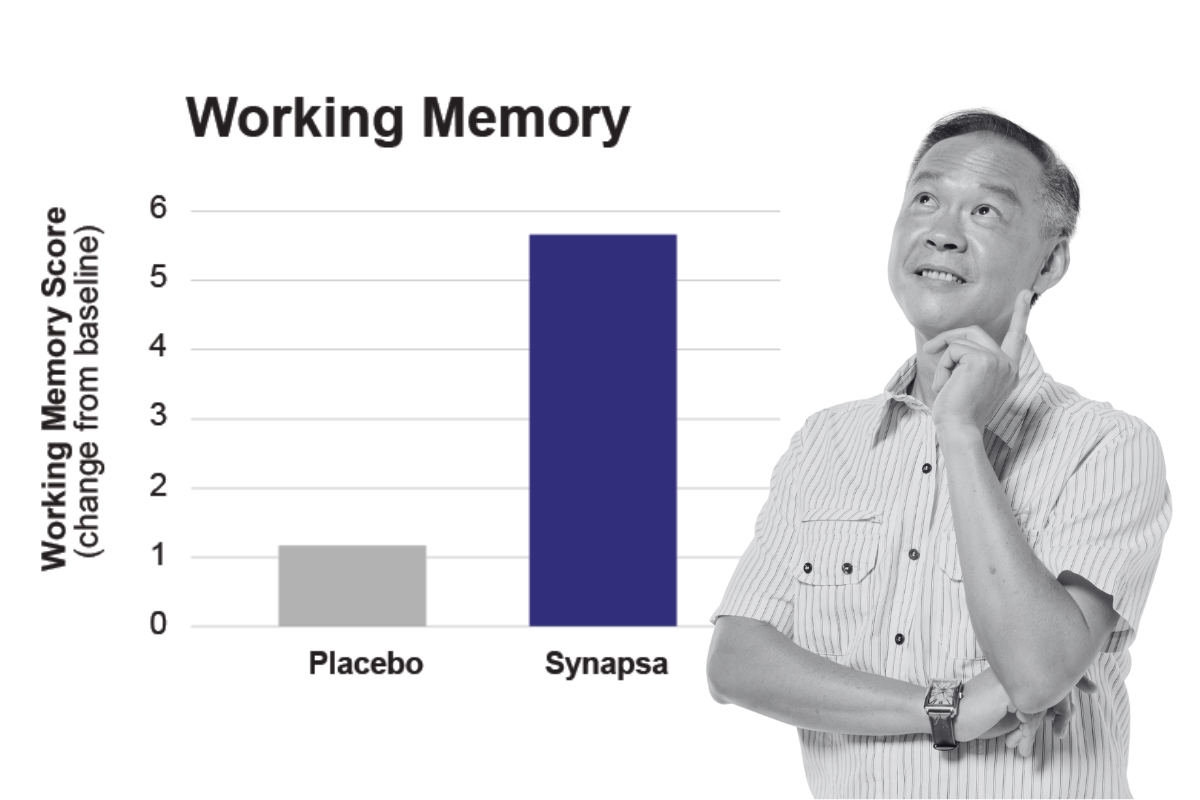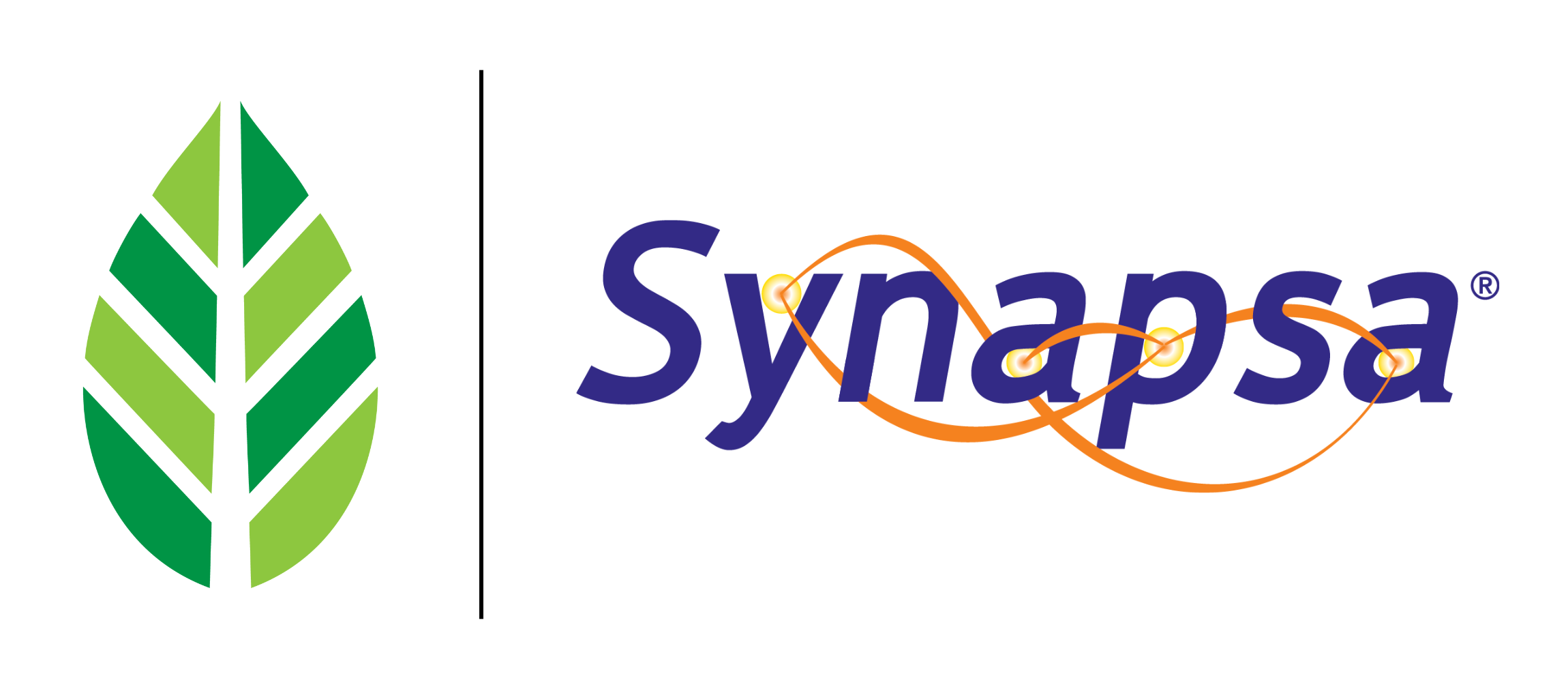-
Ingredient SolutionsQuickly narrow your search. Browse products in our sortable catalog. View Catalog
-
ApplicationsQuickly narrow your search. Browse products in our sortable catalog. View Catalog
-
ResourcesRecently Posted
-
PLT People & Planet
-
About
Our international network, passionate team of experts and extensive industry knowledge is what sets us apart.
 Seth FlowermanCEO
Seth FlowermanCEO
Synapsa® Natural Memory Support
OVERVIEW
Scientifically studied support for healthy adults who want peak cognitive performance.

40 Years
Synapsa has been the subject of scientific study for four decades.
-1.png?width=200&height=200&name=product-synapsa-subjects%20(1)-1.png)
689 Subjects
Synapsa’s efficacy has been established with a large, diverse study population.

7 Clinical Studies
Synapsa is one of the most studied cognitive support ingredients available today.

Fast-acting
Synapsa has two studies that demonstrate ‘acute’ performance, with benefits seen in a matter of hours.
FEATURES & BENEFITS
Seven clinical studies |
|
Faster information processing |
|
Improved learning rate |
|
Decreased forgetting rate |
|
Improved memory consolidation |
|
Better multitasking accuracy |

CERTIFICATIONS
VEGAN
GLUTEN-FREE
NON-GMO
HALAL
KOSHER
A novel botanical complex designed for full-spectrum immune support
Synapsa Natural Memory Support is a unique, standardized extract of Bacopa monnieri, with a wide range of active constituents that contribute to its therapeutic properties. Bacopa monnieri (also known as brahmi) is an herb that has been used in traditional Ayurvedic medicine for centuries.
Bacopa monnieri
Bacopa monnieri, also called brahmi, water hyssop, thyme-leaved gratiola, and herb of grace, is a staple plant in traditional Ayurvedic medicine.

Standardized on Bacosides
The principal constituents in Bacopa monnieri with neurophysiologic activities are bacosides. Synapsa is standardized for bacosides A and B (no less than 55% of combined bacosides).
Rhodiola rosea
Rhodiola rosea is a plant native to remote Arctic climates in Asia, Europe and North America.

Exciting Phytochemistry
The root of the plant contains around 140 chemical compounds including phenols, rosavin, rosarin, salidroside and more.
Detail 1
Kale chips cold-pressed put a bird on it mumblecore kogi brooklyn farm-to-table blue bottle yuccie authentic kombucha migas. Literally tilde tacos paleo.

Detail 2
Kale chips cold-pressed put a bird on it mumblecore kogi brooklyn farm-to-table blue bottle yuccie authentic kombucha migas. Literally tilde tacos paleo.
RESEARCH
Relevant Studies for the ‘Peak Performance’ Demographic
The unique composition of Synapsa has been studied in a range of high-quality clinical trials for over a decade. The patented, standardized Synapsa extract has been the focus of seven ‘foundational’ clinical trials and six ‘targeted’ clinical trials over the last thirty-five years. The most intriguing studies include:
Stough, 2001 showed a statistically significant improvement in the speed of visual information processing, learning rate and memory consolidation in subjects 18-60 years of age consuming 300 mg/day Synapsa. A statistically significant reduction in the rate of forgetting was also observed.
Roodenrys, 2002 conducted a randomized, double-blind, placebo-controlled 12-week trial that demonstrated a significant effect of Synapsa (300mg/d) on the retention of new information by participants 40-65 years of age.
Stough, 2008 conducted a randomized double-blind, placebo-controlled 90-day study with 107 participants, ages 18-60, consuming 150 mg/day. Synapsa showed a statistically significant improvement in working memory, visual information processing (sustained attention) and accuracy in complex cognitive tasks.
Downey, 2012 studied two different doses (320 mg/640 mg) in a study on sustained cognitive performance, examining the acute (short term) effect of Synapsa in healthy adult subjects. Significantly improved performance was seen in faster information processing and improved decision-making time in a multitasking environment.
Two Types of Use Supported by Studies
Studies show support for two distinct types of benefit from Synapsa Natural Memory Support: daily, long-term use (chronic) to enhance learning and memory, and short-term use (acute) to improve mental performance in cognitively demanding environments such as test-taking. In addition, the majority of studies behind Synapsa have been conducted on healthy adult subjects between 18-65. From a market standpoint, in the United States today, more than 120 million people are considered knowledge workers who use cognitive skills as a daily part of their jobs. In addition, recent estimates of college students range upwards of 21 million. Both groups are good targets for new formulations based on Synapsa, along with any consumers looking for support for learning, memory and mental performance.
CLINICAL HIGHLIGHTS
Clinical Study: Working Memory, Visual Information Processing and Accuracy

A randomized, double-blind, placebo-controlled 90-day study with 107 participants, ages 18-60, consuming 150 mg/day. Synapsa showed a statistically significant improvement in working memory, visual information processing (sustained attention) and accuracy in complex cognitive tasks compared to placebo.

Clinical Study: Synapsa Improves Recall, Retention and Learning

A randomized, double-blind, placebo-controlled trial, healthy subjects (n=84, average age: 49) were given either Synapsa (320 mg/d if < 90 kg, 450 mg/d if >90 kg) or placebo for 12 weeks. There were no differences in performance between groups at baseline. There was a significant improvement in delayed recall of word pairs compared to placebo (p<0.05), indicating retention of new information or learning.
Roodenrys S, et al. Booth Chronic effects of Brahmi on human memory. Neuropsychopharmacology. 2002; 27:279-281.

Clinical Study: Synapsa Improves Working Memory and Visual Processing

A study sought to build on prior research by utilizing a computerized assessment battery of tests (Cognitive Drug Research; CDR), rather than the standard battery that had been used in past studies. It also used a larger population. Healthy participants (n=107, average age: 43) were given Synapsa (320 mg/d) or placebo in one dose daily for 12 weeks. Neuropsychological tests were given at baseline and 12 weeks. Those taking Synapsa performed statistically significantly better on tests of working memory (p=0.035), with specific improvement on the accuracy scores of the Spatial Working Memory task, and rapid visual processing.
Stough C, et al, Examining the nootropic effects of a special extract of Bacopa monniera on human cognitive functioning. Phytotherapy Res. 2008; 22:1629- 1634.

MARKET OPPORTUNITIES
Cognitive & Mood
Synapsa has shown to speed learning, enhance memory, and improve mental performance.
ORIGIN STORY
Ancient knowledge. Modern science.
Bacopa monnieri (L.) (syn. Bacopa monnieri Hayata & Matsum) is a creeping perennial herb indigenous to India, Southeast Asia, and Australia. With succulent, elongated leaves and small, white or light purple flowers, it is commonly known as Indian pennywort or water hyssop.

Support Memory and Intellectual Function
For over 3,000 years, Bacopa monnieri has been used in traditional Ayurvedic medicine to support memory and intellectual function. The 6th century CE Ayurvedic text Caraka Samhita recommends it for anxiety, inability to concentrate, and poor cognition (literally “mind”).

Benefits of Synapsa
Studies show support for two distinct types of benefit from Synapsa Natural Memory Support: daily, long-term use (chronic) to enhance learning and memory, and short-term use (acute) to improve mental performance in cognitively demanding environments such as test-taking.

Cognitive Skills in Everyday Life
The majority of studies behind Synapsa have been conducted on healthy adult subjects between 18-65. From a market standpoint, in the United States today, more than 120 million people are considered knowledge workers who use cognitive skills as a daily part of their jobs.

Cognitive Health for the Underserved Demographic
At PLT, we have been focusing on what we consider to be an underserved demographic – the 18-54 age range. Within this group, we see intense interest in issues such as ‘peak performance,’ ‘well-being’ and ‘quality of life.’ The market opportunity with this group is massive.

INSIGHTS
Support for Peak Performers
While many cognitive health supplements focus on the issue of cognitive decline – mainly in an aging population – the studies behind Synapsa focus on ‘peak cognitive performance’ outcomes that offer benefits for a much broader public. In seven double-blind, placebo-controlled clinical studies, healthy adults using Synapsa showed significantly improved performance in areas such as visual processing, learning rate, working memory, information retention and mental performance in cognitively demanding environments versus a placebo regimen.

“The global brain health supplements market size was valued at USD 8.63 billion
in 2022 and is expected to expand at a compound annual growth rate (CAGR) of 13.3% from 2023 to 2030.”
Grandview Research, May 2023
RESOURCES



Explore the latest in cognitive support for well-being with PLT's ingredient platform. In this webinar, you'll discover the science behind cognitive ingredients and how to incorporate them into formulations.

Synapsa™ Natural Memory Support for “Peak Cognitive Performance” in Healthy Adults.

Add the Element of Cognitive Support to Your Products
PLT has a broad range of cognitive health support solutions with strong scientific support. Find out how we can help you put these ingredients to work in your products.
- Expertise
- Ingredient Solutions
- All
- Animal Health & Wellness
- Beauty from Within
- Joint & Bone
- Cardiovascular
- Cognitive Performance
- Energy
- Functional Foods & Beverages
- Healthy Aging & Longevity
- Hydration+
- Immune & Respiratory Health
- Men’s Health
- Muscle Health
- Pain & Mobility
- Plant-Based Nutrition
- Sexual Health
- Sleep
- Sports & Active Nutrition
- Stress & Mood
- Weight Management
- Women’s Health
- Applications
- Resources
- PLT People & Planet
- About
These products are not intended to diagnose, treat, cure or prevent disease. This website is for informational purposes only.



















